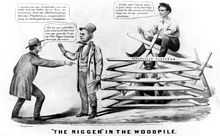Nigger in the woodpile

A nigger in the woodpile or fence is a dated English figure of speech[1] meaning "some fact of considerable importance that is not disclosed—something suspicious or wrong". In the 21st century, use of the phrase in English-speaking countries by public officials or people in positions of power has often been followed by public criticism and demands for apology, because of the offensive nature of the term "nigger" over the decades.
Origin
Both the 'fence' and 'woodpile' variants developed about the same time in the period of 1840–50 when the Underground Railroad was flourishing. The evidence is slight, but it is presumed that they were derived from actual instances of the concealment of fugitive slaves in their flight north under piles of firewood or within hiding places in stone walls.[2] Another possible origin, comes from the practice of transporting pulpwood on special rail road cars. In the era of slavery, the pulpwood cars were built with an outer frame with the wood being stacked inside in moderately neat rows and stacks. However, given the nature of the cars, it was possible to smuggle persons in the pile itself; possibly giving rise to the term.
Usage
An American film comedy titled A Nigger in the Woodpile was released in 1904,[3] and the idiom was common in literature and film during the 1920s and 30s. Example include the original 1927 version of the Hardy Boys book "The House On the Cliff" (pg. 77), where Frank Hardy uses the expression (removed when the story was revised in 1959), and the old-time band Skillet Lickers recording a song called Nigger in the Woodpile in 1930.[4] Agatha Christie used the phrase as the title of Chapter 18 of the Hercule Poirot novel "Dumb Witness" which was later published in the U.S. as "Poirot Loses a Client". The chapter was later retitled "A Cuckoo in the Nest".
The term declined in use during the 20th century, and now the occasional use of this phrase by public figures has often been followed by an apology.[5][6][7][8][9][10]
See also
- Ten Little Niggers, Agatha Christie's original title for And Then There Were None
References
- ↑ http://www.merriam-webster.com/dictionary/nigger%20in%20the%20woodpile
- ↑ "Heavens to Betsy" (1955, Harper & Row) by Charles Earle Funk
- ↑ Stewart, Jacqueline Najuma (2005). Migrating to the Movies: Cinema and Black Urban Modernity. Berkeley: University of California Press. p. 1. ISBN 0520233506.
- ↑ Steve Leggett. "Skillet Lickers, Vol. 4: 1929-1930 - The Skillet Lickers - Songs, Reviews, Credits, Awards - AllMusic". AllMusic.
- ↑ Insurance boss apologises for racist remark Daily Telegraph, Jan 25, 2007 – phrase used by an executive of Standard Life
- ↑ BBC apologises for general's 'racist remark' in radio interview, The Independent, Dec 24, 2005 – phrase used by General Patrick Cordingley
- ↑ Gary Younge, Not while racism exists, The Guardian, Jan 7, 2002 – use attributed to Germaine Greer
- ↑ Media Watch: Alan Moans (16/04/2007)
- ↑ "Police chief caught on tape using slur"
- ↑ "Racist Comment Shocks Planners", The Sydney Morning Herald, Jul 27, 2013
External links
- Racist parody of Republican platform from 1860 Presidential campaign, in Harper's Weekly
- Epistemology of the Woodpile, University of Toronto Quarterly
- History News Network blog post about origins of term
- History News Network blog post about a recent controversy
- Phrase used in 1918 advertisement for Patterson Publishing Company The Rotarian magazine